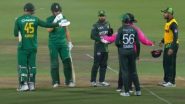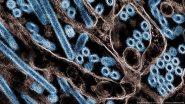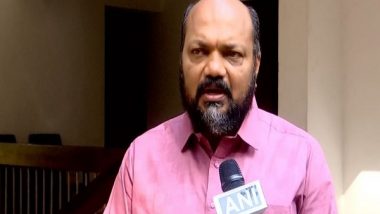By Aparna Jacob
Ernakulam (Kerala) [India], May 26 (ANI): After facing criticism from environmentalists, locals, and opposition parties, the Kerala government has decided to hold a high-level meeting and prepare an action plan to prevent the reoccurrence of the incident. An announcement in this regard was made by the Kerala Industries Minister P Rajeev on Sunday.
Also Read | Nuclear War Fears: ‘Higher Chance Donald Trump Might Start Nuclear Warfare Than Alien Leader,’ Claims AI.
Mass death of fish was reported in a tributary of the Periyar near Pathalam in Ernakulam district earlier this week.
While speaking to the media in Kalamassery, the minister assured a permanent solution to protect the river. "The government will come out with a permanent solution to protect Periyar. For this, a high-level meeting will be held in Thiruvananthapuram on May 27, and an action plan will be prepared. Then the action plan will be discussed and implemented by including the local bodies in the region," P Rajeev said.
Taking this as a lesson, the aim is to find a permanent solution to prevent such incidents from recurring, he added.
The minister also said a report has been sought from the State Pollution Control Board and Kerala University of Fisheries and Ocean Studies (KUFOS) on the mass fish death, and further action will be taken based on both reports.
He further said that the loss to fish farmers will also be considered. "The government has already discussed and decided to form an authority to look upon the protection of rivers. It will be examined in detail. Based on the report, Periyar's protection will be ensured with general coordination," the Minister said.
"The University of Fisheries has also appointed an expert committee based on discussions with the Minister of Fisheries. The sub-collector will submit the collated report," he added.
The Minister further announced an independent inquiry if any contradictions are found in the reports submitted by PCB and KUFOS.
"If there are any contradictions in the reports of the State Pollution Control Board and KUFOS, an independent investigation will be conducted. The respective departments have submitted the report to the Sub Collector, and they are to reach the state government by Monday," he said.
On being asked about the report from the Kerala University of Fisheries and Ocean Studies (KUFOS) that claimed the presence of dangerous levels of ammonia, hydrogen sulfide, and unidentified toxins in the water, the minister said that experts claimed it could be from organic waste or chemical waste.
"If it is specified in the report that an inspection is required in this regard, the government will consider it. Garbage including poultry and animal slaughter waste is thrown into the waters. A general examination of Periyar is also under consideration," he said.
"It has been noticed that fish have died in Kumbalangi too. The reason can be found only after scientific examination," he added.
Earlier the Kerala Industries Minister chaired a meeting over the issue on Thursday. The meeting was attended by Ernakulam Sub Collector K Meera, Elur Municipality Chairman AD Sujil, GCDA Chairman K Chandran Pillai, Pollution Control Board Chairperson S Srikala, and officials of various departments among others.
According to official sources, KUFOS, in its report submitted to the sub-collector on Saturday, said that the death of fish in massive numbers in the Periyar river was due to dangerous levels of ammonia, hydrogen sulfide, and unidentified toxins in the water.
As per the report, detailed chemical test results are required to know how and from where such a large quantity of chemicals reached the water in Periyar. However, the report submitted by the Kerala Pollution Control Board stated that the presence of chemical pollution was detected and the reason for the death of the fish was the low oxygen level.
Speaking on the reports, the sources said that the unidentified toxins present in the water at high levels needed to be traced.
"There is something wrong with the state pollution control board's report because they couldn't detect the presence of chemicals and toxins in water. They didn't have a credible data set to conduct the tests to identify the presence of chemicals. They are at lapse here. They didn't monitor the pollution discharge into the river water," the source told ANI.
The fish farmers have lodged complaints seeking legal recourse for compensation following the death of fish. (ANI)
(This is an unedited and auto-generated story from Syndicated News feed, LatestLY Staff may not have modified or edited the content body)













 Quickly
Quickly

















